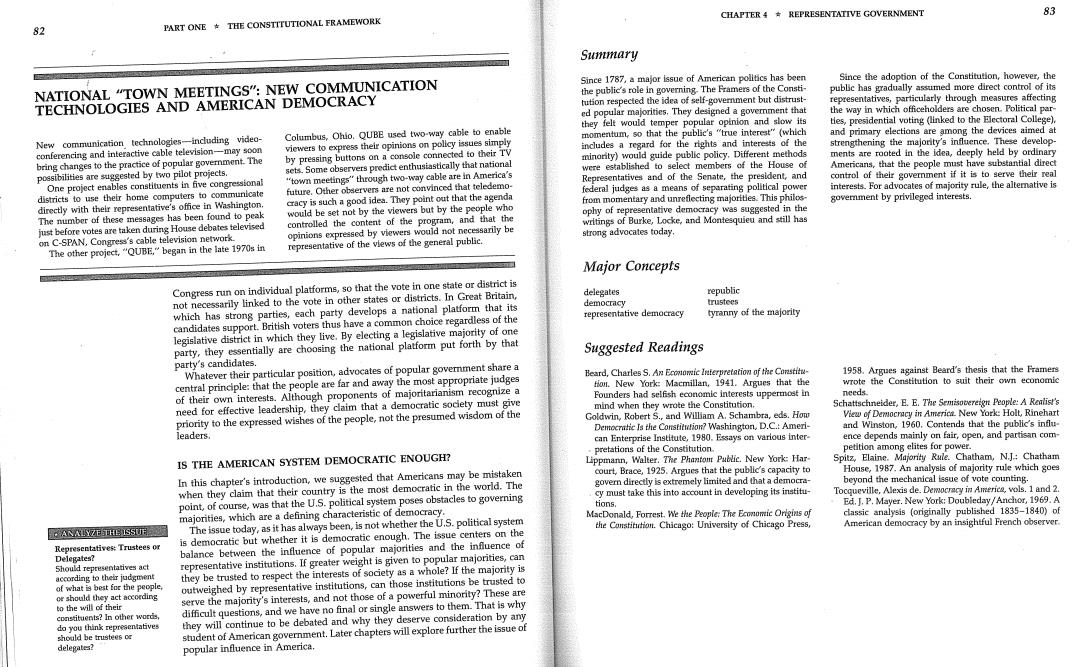正在加载图片...

CHAPTER4 REPRESENTATIVE GOVERNMENT 83 82 PART ONE THE CONSTITUTIONAL FRAMEWORK Summary Since 1787,a major issue of American politics has been Since the adoption of the Constitution,however,the NATIONAL "TOWN MEETINGS":NEW COMMUNICATION the public's role in governing.The Framers of the Consti- public has gradually assumed more direct control of its TECHNOLOGIES AND AMERICAN DEMOCRACY tution respected the idea of self-government but distrust- representatives,particularly through measures affecting ed popular majorities.They designed a govemment that the way in which officeholders are chosen.Political par they felt would temper popular opinion and slow its ties,presidential voting (linked to the Electoral College). and primary elections are among the devices aimed at New communication technologies-including video- Columbus,Ohio.QUBE used two-way cable to enable momentum,so that the public's "true interest"(which viewers to express their opinions on pollcy issues simply includes a regard for the rights and interests of the strengthening the majority's influence.These develop- conferencing and interactive cable television-may soon by pressing buttons on a console connected to their TV minority)would guide public policy.Different methods ments are rooted in the idea,deeply held by ordinary bring changes to the practice of popular government.The sets.Some observers predict enthusiastically that national were established to select members of the House of Americans,that the people must have substantial direct possibilities are suggested by two pilot projects. One project enables constituents in five congression "town meetings"through two-way cable are in America's Representatives and of the Senate,the president,and control of their government if it is to serve their real interests.For advocates of majority rule,the alternative is districts to use their home computers to communicate future.Other observers are not convinced that teledemo federal judges as a means of separating political power cracy is such a good ides.They point out that the agenda from momentary and unreflecting majorities.This philos- goverment by privileged interests. directly with their representative's office in Washington The number of these messages has been found to peak would be set not by the viewers but by the people who ophy of representative democracy was suggested in the just before votes are taken during House debates televised controlled the content of the program,and that the writings of Burke,Locke,and Montesquieu and still has on C-SPAN,Congress's cable television network. opinions expressed by viewers would not necessarily be strong advocates today. The other project,"QUBE,"began in the late 1970s in representative of the vlews of the general public. Major Concepts Congress run on individual platforms,so that the vote in one state or district is not necessarily linked to the vote in other states or districts.In Great Britain, delegates republic which has strong parties,each party develops a national platform that its democracy trustees tyranny of the majority candidates support.British voters thus have a common choice regardless of the representative democracy legislative district in which they live.By electing a legislative majority of one party,they essentially are choosing the national platform put forth by that Suggested Readings party's candidates. Whatever their particular position,advocates of popular goverment share a Beard,Chatles S.An Ecomomic Interpretation of the Constitu- 1958.Argues against Beard's thesis that the Framers central principle:that the people are far and away the most appropriate judges fion.New York:Macmillan,1941.Argues that the wrote the Constitution to suit their own economic of their own interests.Although proponents of majoritarianism recognize a Founders had selfish ecnmc interests uppermos in needs. need for effective leadership,they claim that a democratic society must give mind when they wrote the Constitution. Schattschneider,E.E.The Semisocereignt People:A Renlist's priority to the expressed wishes of the people,not the presumed wisdom of the Goldwin,Robert $.and William A.Schambra,eds.Hom View of Democracy in America.New York:Holt,Rinehart Democratic Is the Constitulion?Washington,D.C.:Ameri- and Winston,1960.Contends that the public's influ leaders. can Enterprise Institute,1980.Essays on various inter- ence depends mainly on fair,open,and partisan com- pretations of the Constitution. petition among elites for power. IS THE AMERICAN SYSTEM DEMOCRATIC ENOUGH? Lippmann,Walter.The Phantom Pablic.New York:Har Spitz,Elaine.Majority Rule.Chatham,N.J:Chatham court,Brace,1925.Argues that the public's capacity to House,1987.An analysis of majority rule which goes In this chapter's introduction,we suggested that Americans may be mistaken when they claim that their country is the most democratic in the world.The govemn directly is extremely limited and that a democra beyond the mechanical issue of vote counting. cy must take this into account in developing its institu- Tocqueville,Alexis de.Democracy in America,vols.1 and 2. point,of course,was that the U.S.political system poses obstacles to governing hons. Ed.J.P.Mayer.New York:Doubleday/Anchor,1969.A majorities,which are a defining characteristic of democracy MacDonald,Forrest.We the People:The Ecomomic Origins of classic analysis (originally published 1835-1840)of ·AN水YZ元HE ISSUE The issue today,as it has always been,is not whether the U.S.political system the Constittion.Chicago:University of Chicago Press, American democracy by an insightful French observer. Representatives:Trustees or is democratic but whether it is democratic enough.The issue centers on the Delegates? balance between the influence of popular majorities and the influence of Should repre sentadives act representative institutions.If greater weight is given to popular majorities,can they be trusted to respect the interests of society as a whole?If the majority is of what is best for the people outweighed by representative institutions,can those institutions be trusted to oe should they act aocording to the will of their serve the majority's interests,and not those of a powerful minority?These are constituents?In other words difficult questions,and we have no final or single answers to them.That is why do you think representatives they will continue to be debated and why they deserve consideration by any should be trustees or student of American government.Later chapters will explore further the issue of delegates? popular influence in America